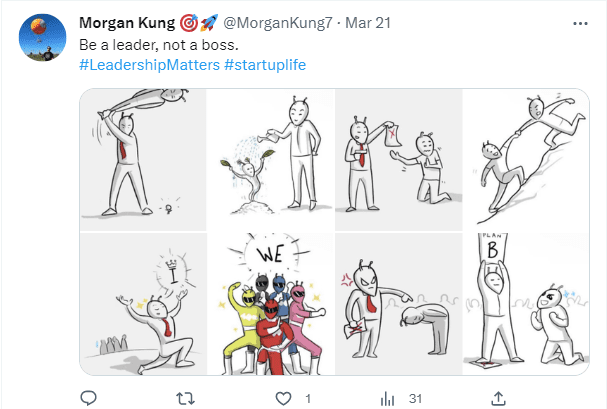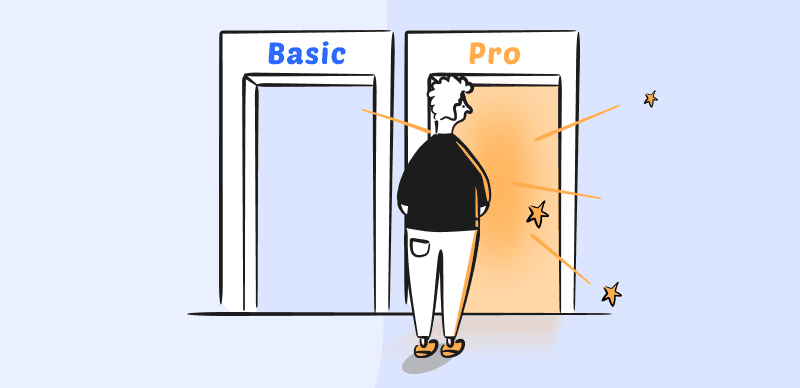Being a startup founder is not easy; you must face challenges from the outside environment, the stress of delivering products on time, the energy to manage your mental and physical health, and the ability to manage everything simultaneously. It’s not exaggerated, and it’s exactly how founders are regarded, as a jack of all trades, based on most people’s impression.
I, for one, enjoy being able to do anything, especially things that interest me.
But, as I began my journey to become a startup founder, I realized that I was far from capable of doing anything. I learned a lot and improved a lot from other founders and their stories.
I’m learning how to be a good founder and want to know what I should work on, so I list some of the best qualities that founders should have and why they’re so important.
Table of Contents: hide
Be a kid
I’m not claiming that every founder is a true child; rather, I believe that we should maintain our childlike curiosity and desire to learn new things.
Remember when you were a baby or a child and you were curious about everything, eager to learn how to ride a bicycle, skate, use sticks, and pronounce A, B, C, D… That’s when we grow so quickly and learn so much.
Curiosity about the world motivates us to study and absorb new information. As founders, we still have a lot to learn, such as how to run a team, how to build a product, what is the best way to market, which platform is the best for connecting, what is trending now, and how my product can keep up with the latest trend…
It’s a long journey with a lot of new things to discover, so stay curious and explore like a kid.
Know yourself well
This ability is not limited to founders; most people possess it. However, founders must do better.
When you understand your strengths, you will focus all of your efforts on maximizing your advantages. For example, if you are a developer, simply focus on improving the product to be the best; if you are a designer, simply raise your professional opinion; and if you are a marketer, you can lead the way for your team to where you are hedging. Also, if you are good at talking, you can join some meetups to bring more cooperators and opportunities to your product; if you enjoy writing things like me, recording the process of building in public can be funny and inspiring, which may attract more people’s attention.
You can avoid making mistakes if you know where you fall short and where you need to improve for your team and your product. If you know your weakness, you can delegate related tasks to team members who can complete the work better or more efficiently than you could on your own.
Being self-aware enough to recognize when and where you need additional assistance is a coveted skill that defines a great entrepreneur.
Be passionate and positive
Many people have told me that you should maintain a positive attitude in life, and they are correct.
As a founder, you will face a variety of challenges that you have never encountered before.
Imagine that:
- Even if you put in a lot of effort and recommend it to others all day and night, your product may get 0 users at first.
- After you launch the product on Product Hunt or other platforms, no one will upvote for you, and no one will give you feedback, so you won’t know if your product is a good fit for the market.
- Users are very critical of your product, but you and your team are unable to determine what is wrong with it; the only thing you can do is comfort your users and try to figure it out as soon as possible.
- Although you have attended numerous meetups, no one is willing to invest in you, will you feel so depressed and want to end the project?
To overcome those obstacles, you must be passionate and optimistic, particularly when it comes to soliciting investors.
The founder and their team are highly valued by early investors. They are looking for founders who they believe are capable of overcoming the challenge and completing the required work. They’re figuring out if the founder has what it takes to succeed. The founder’s passion is critical at that moment.
Be a visionary
It goes without saying that being a visionary as a founder is critical. It will assist you in finding the right team member, finding the right way for your product, adding a funnel to your team on a continuous basis, and communicating with the entire world.
But, before you can become a visionary, you must maintain a great habit: reading and digesting the news, whether in your field or others. At 6 a.m., I usually read financial and technology news, which helps me target the market for my project.
Furthermore, being an expert in your field and attempting to be familiar with other fields is essential. All of your knowledge combined can help you maintain a clear vision of the industry, and it will be much easier to engage with other experts in your field, giving you more opportunities to collaborate.
Be modest and humble
No one is perfect, including founders. From my side, I think a great founder should be willing to admit shortcomings and make changes, which means we can be confident, but not arrogant.
It will help you in a variety of ways. Being able to see your own shortcomings as well as the strengths of others is a basic ability for most founders; only in this way will you learn quickly and continue to improve.
For the sake of your teammates, it makes you more relatable to them. Allowing them to approach you with ideas and suggestions gives them ownership of their roles, and when this happens, people tend to perform at their best. It’s a win-win situation. So it comes to the next ability, be a leader, not a boss.
Be nice to your team
I once retweet a mem on Twitter, which reveals my attitude towards my team.

What I Retweet on Twitter about How to Be a Leader
I will always appreciate teamwork. I’m not a particularly outgoing person; I’m just a lucky guy. All of my teammates, whether I worked with them a few years ago or now, have always encouraged me to become more confident and willing to share. Because of them, I dare to begin again, and I am confident we will accomplish great things.
As the old saying goes, teamwork makes the dream work. You will get an excellent product if you value your team. Your team members will be at ease with openness and honesty, discussing without hesitation, and strengthening team bonds in such a team.
Overall, no one can teach you how to be a successful founder. We’re all humans with different strengths and weaknesses. You can either follow the suggestions or be yourself; just remember to be yourself and treat team members well.



